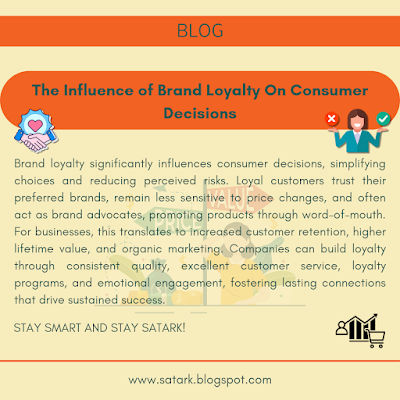The Influence of Brand Loyalty on Consumer Decisions
In the bustling marketplace of today’s economy, brand loyalty stands as a cornerstone of consumer decision-making. From the food we eat to the technology we use, the brands we trust significantly influence our purchasing choices. This blog explores the vital role brand loyalty plays in consumer decision-making, highlighting its impacts, benefits, and how businesses can cultivate it.
Understanding Brand Loyalty
Brand loyalty is the tendency of consumers to continuously purchase the same brand's products or services over time. It goes beyond mere repeat purchases; it encapsulates a deep emotional connection and trust in the brand. Loyal customers are not only repeat buyers but also brand advocates who promote the brand through word-of-mouth.
The Emotional Connection
At the heart of brand loyalty lies an emotional connection. Consumers develop a sense of trust and familiarity with brands that consistently meet their expectations. This bond often transcends rational decision-making processes, allowing emotions to guide choices. For example, an Apple loyalist may choose an iPhone over a competitor's product, not merely for its features but for the sense of belonging and identity associated with the Apple brand.
Impacts on Consumer Decision-Making
1. Reduced Decision-Making Effort:
Loyal consumers spend less time and effort on decision-making. Knowing that a brand consistently delivers quality reduces the need to evaluate other options, streamlining the purchasing process.
2. Perceived Risk Reduction:
Brand loyalty mitigates perceived risks associated with purchasing new or unfamiliar products. Trust in a brand's reliability and quality assures consumers that they are making safe choices.
3. Price Insensitivity:
Loyal customers are often less sensitive to price changes. Their trust and satisfaction with a brand’s offerings make them willing to pay a premium, leading to sustained revenue for businesses even during economic fluctuations.
4. Consistent Consumption Patterns:
Brand loyalty fosters predictable consumption patterns. Companies can rely on steady sales from loyal customers, enabling better demand forecasting and inventory management.
Benefits for Businesses
1. Increased Customer Retention:
Retaining loyal customers is cost-effective compared to acquiring new ones. Loyal customers tend to make more frequent purchases and spend more per transaction.
2. Word-of-Mouth Marketing:
Satisfied and loyal customers are powerful marketers. Their recommendations to friends and family can drive new customer acquisition without additional marketing expenses.
3. Brand Advocacy:
Loyal customers often become brand advocates, actively promoting the brand on social media, leaving positive reviews, and participating in brand communities. This organic promotion enhances brand visibility and credibility.
4. Higher Lifetime Value:
Loyal customers have a higher lifetime value (LTV). Their consistent patronage and willingness to purchase premium products or services increase the overall revenue generated per customer.
Cultivating Brand Loyalty
Building and maintaining brand loyalty requires a strategic approach. Here are some key strategies businesses can adopt:
1. Consistent Quality:
Ensure consistent product or service quality to meet and exceed customer expectations. Consistency builds trust and reliability, foundational elements of brand loyalty.
2. Exceptional Customer Service:
Provide exceptional customer service to address inquiries, resolve issues, and show customers that their satisfaction is paramount. Personalising customer interactions can further enhance loyalty.
3. Engaging Marketing Campaigns:
Develop marketing campaigns that resonate emotionally with the target audience. Storytelling, relatable brand values, and social responsibility initiatives can strengthen emotional bonds.
4. Loyalty Programs:
Implement loyalty programs that reward repeat purchases. Points systems, exclusive discounts, and special offers incentivise continued patronage.
5. Customer Feedback:
Actively seek and incorporate customer feedback to improve products and services. Demonstrating that customer opinions matter fosters a sense of inclusion and loyalty.
6. Community Building:
Build a community around the brand through social media, events, and interactive content. Engaging with customers and creating a sense of belonging can deepen loyalty.
Conclusion
In conclusion, brand loyalty is a powerful driver of consumer decision-making. It reduces decision-making effort, lowers perceived risks, and encourages price insensitivity, benefiting both consumers and businesses. For companies, cultivating brand loyalty leads to increased customer retention, organic marketing through word-of-mouth, and higher lifetime value. By focusing on consistent quality, exceptional service, and engaging marketing strategies, businesses can build lasting emotional connections with their customers, ensuring sustained success in a competitive marketplace.
STAY SMART! STAY SATARK!







12 Comments
Very informative!!
ReplyDeleteThis comment has been removed by the author.
ReplyDeleteReally helpful and informative
ReplyDeleteAn impressive blog that clearly explains the impact of brand loyalty on consumers and businesses
ReplyDeleteVery informative
ReplyDeleteimpressive
ReplyDeleteVery informative
ReplyDeleteInsightful!
ReplyDeleteVery informative and impressive 👍
ReplyDeleteWell explained 🙌
ReplyDeleteVery informative
ReplyDeleteInsightful
ReplyDelete